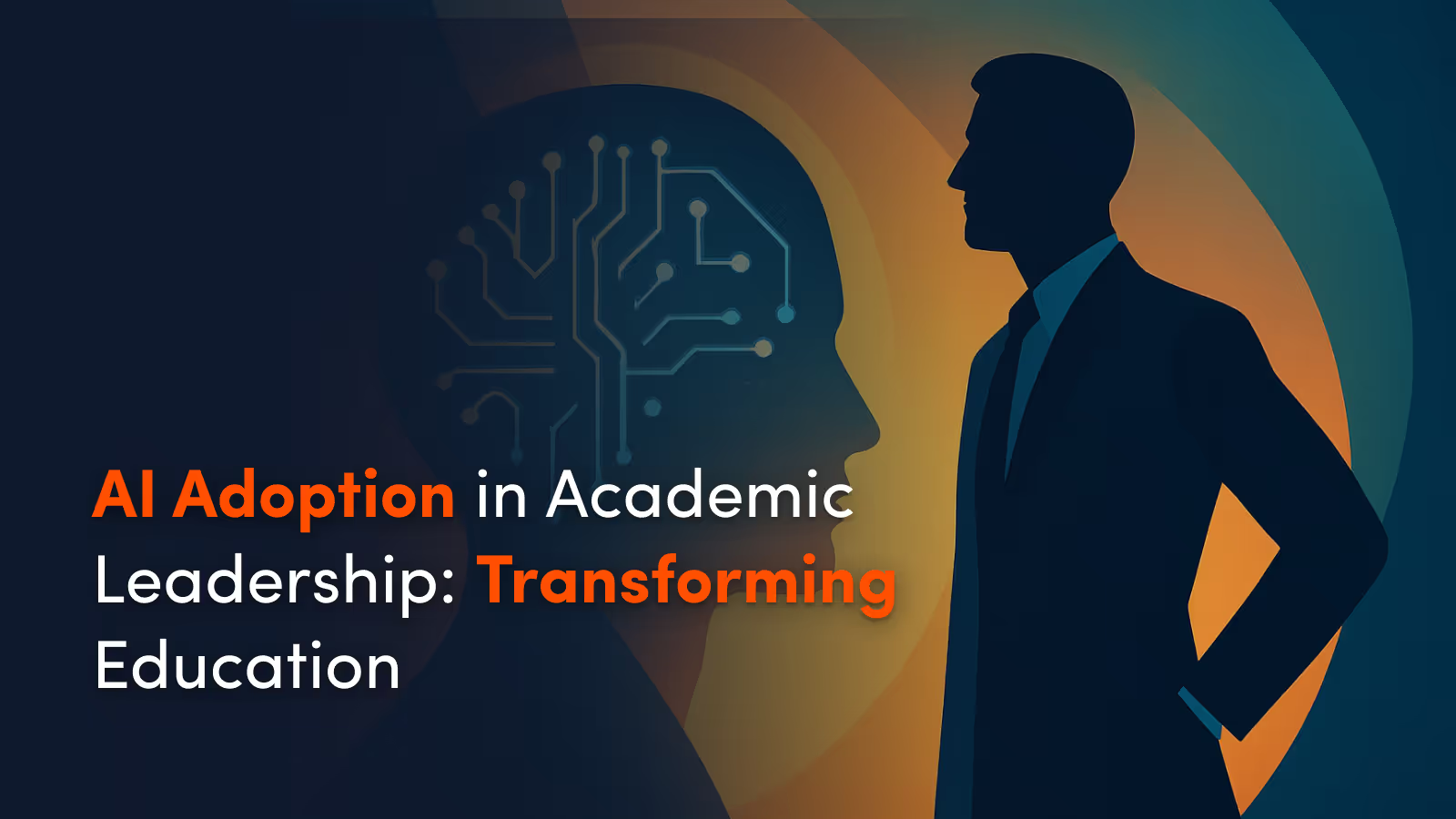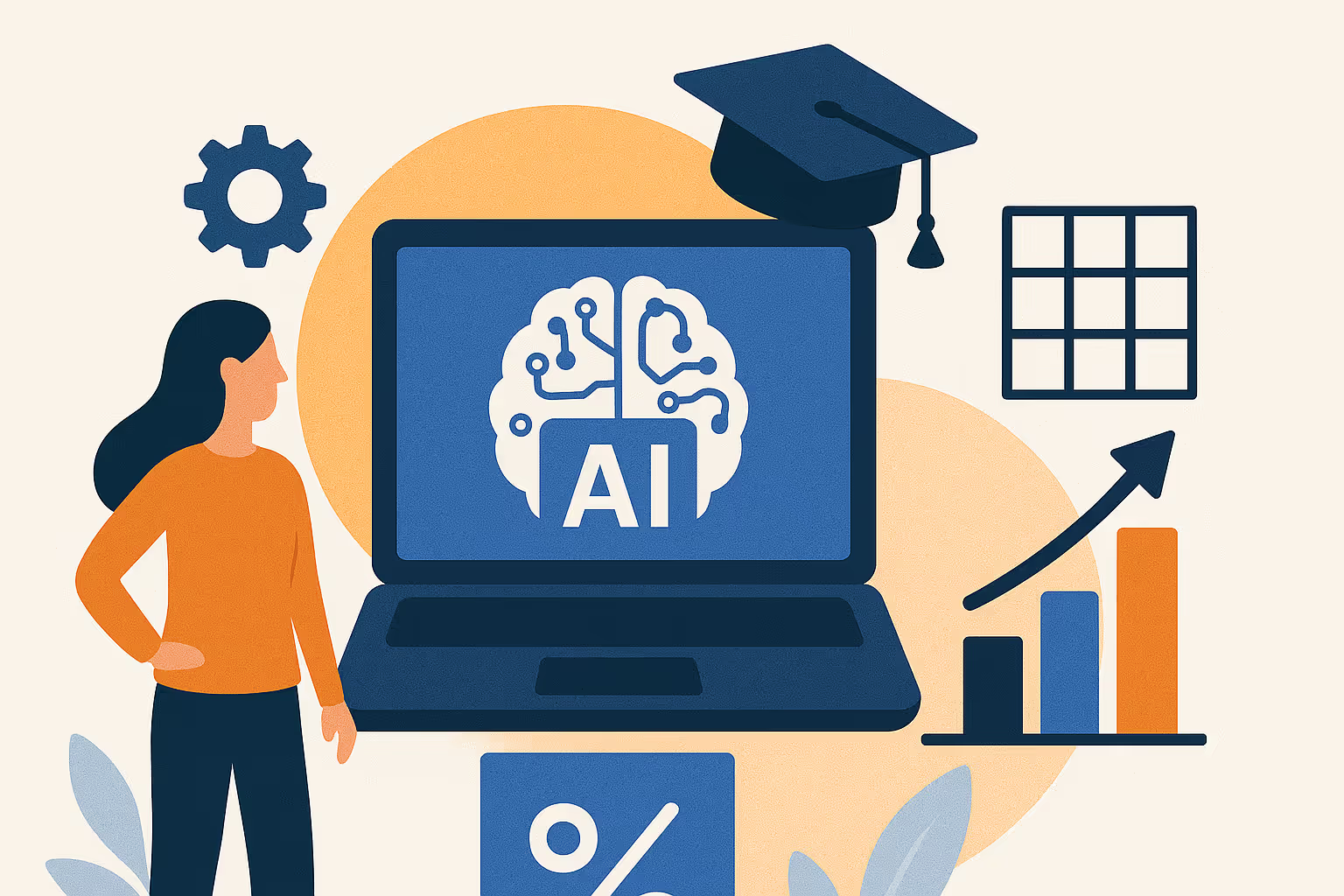About the Blog
Key Takeaways
- AI is revolutionizing academic leadership by enhancing decision-making, streamlining operations, and personalizing the student experience.
- Institutions are leveraging automation processes and predictive analytics for improved strategic planning, resource allocation, and student lifecycle management.
- Real-world applications like AI-powered chatbots, faculty recruitment tools, and smart campus security systems are driving operational efficiency.
- Ethical AI university practices are essential to address concerns around data privacy, algorithmic bias, and faculty resistance to AI integration.
How AI is Shaping the Future of Academic Leadership
Artificial Intelligence is no longer a futuristic concept—it’s a daily reality reshaping academic leadership across institutions. As higher education faces mounting pressure to adapt and evolve, AI is stepping up as a key player in transforming decision-making, streamlining operations, and elevating student experiences. From campus management to curriculum design, AI is offering leaders powerful tools to navigate this new era.
What’s most exciting is the way AI is being woven into the student lifecycle—touching everything from recruitment and admissions to advising and career support. Academic leaders are realizing that to build resilience in higher education, they must embrace the opportunities AI offers while navigating its challenges thoughtfully. It’s not just about tech—it’s about shaping a more adaptive, responsive, and data-informed future.
In this blog, we explore the growing role of AI in academic leadership, with a focus on institutional growth, student success, research innovation, and the ethical considerations shaping adoption. Whether you're exploring AI trends or planning to implement automation processes, this guide will help illuminate the path forward.
The Importance of AI Adoption in Academic Leadership
Adopting AI is no longer optional for academic leaders—it’s essential. In an environment marked by declining enrollments, budget pressures, and evolving learner expectations, AI provides a strategic advantage. It offers the ability to make faster, more informed decisions, tailor support services, and reimagine the student experience in real time.
Institutions that successfully integrate AI into leadership practices are unlocking new levels of agility. With intelligent tools in hand, leaders can pivot more quickly, identify inefficiencies, and forecast outcomes with unprecedented accuracy. This not only enhances institutional performance but also boosts stakeholder confidence—from faculty to trustees.
Ultimately, embracing AI isn’t just about being tech-savvy. It’s about cultivating a culture of continuous improvement, where innovation and ethics coexist. This mindset is crucial for developing ethical AI university practices that balance progress with responsibility.
AI-Driven Insights for Institutional Growth
AI’s power lies in its ability to turn massive data sets into actionable insights. For academic leaders, this means smarter planning, sharper forecasting, and better resource management. From predicting enrollment dips to optimizing class sizes, AI is becoming a vital tool for strategic planning.
Institutions are also using AI to align budgeting with real-time data, creating more efficient operations across departments. This translates to faster decision-making cycles and the ability to redirect resources to high-impact areas—especially in response to shifts in student demand or market dynamics.
With AI trends pointing toward increased automation in institutional operations, leaders must learn to harness tools like predictive analytics and machine learning to future-proof their campuses. It's about building resilience in higher education through data-informed leadership.
Boosting Student Success Through AI
At the heart of AI’s promise is its ability to enhance the student experience. Adaptive learning platforms now tailor content to individual learning styles, helping students engage more deeply and perform more consistently. These tools also identify learning gaps early, allowing faculty and advisors to intervene proactively.
AI-powered academic advising systems and early warning dashboards are transforming support services. Institutions can now predict when a student might be at risk of dropping out and offer personalized support—whether academic, emotional, or financial—at the right time.
AI’s impact stretches across the student lifecycle, from enrollment to post-graduation outcomes. For academic leaders, this means having the tools to not just track success, but shape it—delivering on promises of student-centered learning.
Enabling Enhanced Research with AI
AI is also opening new doors for faculty research. With automation taking over repetitive administrative tasks, faculty gain more time to focus on what truly matters: research and innovation. From grading and scheduling to data reporting, AI simplifies the day-to-day so minds can concentrate on discovery.
On the research front, AI tools are speeding up literature reviews, enabling large-scale data analysis, and even assisting in grant writing. Tools like natural language processing and automated summarization help researchers synthesize vast information quickly and effectively.
This not only enhances the quality and quantity of research output but also strengthens institutional reputations. For universities looking to scale innovation, integrating AI into research workflows is a game-changer.
Real-World Applications of AI in Academic Leadership
AI is already reshaping leadership practices in higher ed institutions across the globe. One standout example? AI chatbots are now managing student inquiries at scale—reducing administrative workload while improving response times. It’s a win-win for students and staff alike.
Admissions teams are also using AI to screen applications, assess financial aid eligibility, and identify enrollment patterns. These automation processes allow institutions to optimize staffing and improve yield rates without sacrificing personalization.
The practical impact of AI is clear: by handling the tasks that slow institutions down, it frees up leadership to focus on vision, strategy, and culture—core elements that define a modern university.
Revolutionizing Faculty Recruitment and Development with AI
Hiring top talent is a complex and high-stakes process, and AI is helping simplify it. From scanning resumes to assessing soft skills through video interviews, AI is reducing hiring biases and surfacing the best candidates more efficiently.
Beyond recruitment, AI is also powering professional development. Institutions are using AI-driven learning platforms to customize faculty training and track performance in real-time. This creates a more dynamic and responsive environment for faculty growth.
Academic leadership teams must prioritize ethical AI university practices in these areas—ensuring transparency, fairness, and inclusivity throughout the process. The goal is not just efficiency but equity.
AI-Enhanced Campus Security and Operations
AI isn’t just changing what happens in classrooms—it’s also transforming how campuses are managed and secured. AI-powered surveillance systems now provide real-time threat detection, helping campus safety teams respond more quickly and effectively.
These systems use facial recognition, license plate scanning, and anomaly detection to prevent incidents before they happen. Emergency response is now more coordinated, with AI tools assisting in real-time scenario planning and communication.
Facility management is also getting an upgrade. AI can monitor building occupancy, optimize energy use, and predict maintenance needs—cutting costs and improving sustainability. Together, these applications bring smarter, safer campuses to life.
Ethical Considerations and Challenges in AI Adoption
With great power comes great responsibility. AI’s potential in higher education must be balanced with thoughtful, transparent policies around its use. One of the biggest risks? Algorithmic bias. If unchecked, AI could reinforce inequalities in admissions, hiring, and grading.
To counteract this, institutions must implement systems for auditing AI tools regularly and ensure decisions made with AI are explainable. Building an ethical AI university requires prioritizing fairness, transparency, and accountability at every level.
There’s also the challenge of earning faculty buy-in. Many educators are skeptical of AI’s impact on their roles and worry about being replaced. Leaders must foster a culture of collaboration, where faculty are partners in the AI journey—not casualties of it.
The Future of AI in Academic Leadership
The AI wave in higher ed is just getting started. We’re moving toward more immersive learning experiences, AI-powered student wellness programs, and strategic planning tools that adjust in real-time. The institutions that thrive will be those that embrace innovation and ethics.
Imagine AI systems that guide long-term strategy, track alumni outcomes, and tailor institutional goals to evolving learner needs. That’s where we’re headed. As AI trends evolve, academic leadership will become even more data-informed and proactive.
But future success will require a balance. Embracing AI means committing to innovation and maintaining a strong ethical foundation. The most forward-thinking leaders will understand this dual imperative and champion both progress and integrity.
AI is transforming academic leadership—reshaping how institutions plan, teach, support, and lead. From predictive enrollment models to personalized learning paths, the potential is enormous. But so are the responsibilities. Leaders must adopt AI with intention, grounding each step in transparency, fairness, and a commitment to resilience in higher education.
Frequently Asked Questions
What are some AI tools commonly used in higher education leadership?
Tools like predictive analytics platforms, AI chatbots, adaptive learning systems, and automated data dashboards are widely used.
Can AI replace academic leaders and faculty?
No. AI supports—but does not replace—the decision-making, creativity, and empathy that academic leaders and faculty provide.










